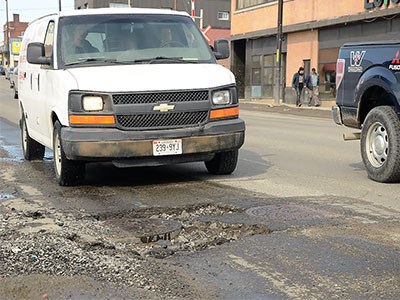The fact that some roads are cracking prematurely in Ontario isn’t news to anyone, but problems are emerging with roads that have been built using new specifications designed to make them last longer.
Simon Hesp, an asphalt researcher at Queen’s University, made headlines recently when he pointed out that at least some of the issues are related to the use of recycled motor oils in asphalt cement.
Hesp has been working with the City of Kingston over the last five years, and is now also working with Timmins to test and build roads using new mixtures. But some of the roads built in Kingston have already started to fail.
“We’ve implemented these new test methods that I’ve developed based on 50 trial sections around the province,” Hesp said. “And some of the pavement has started to crack, which shouldn’t happen.”
He suspects the problem lies with the asphalt cement, and says one of the most likely causes is the mixture they tested at the start wasn’t the same asphalt cement that was used in the pavement.
“Or they added some recycled asphalt to the mixture when we were not looking. And that happens all over the place.”
Hesp is working with the Ministry of Transportation (MTO) to get a handle on why some highways in the province are cracking prematurely.
Ministry spokesperson Bob Nichols said asphalt pavements across Ontario are experiencing early cracking failures and the MTO has been looking for guidance.
Indications are that it’s a problem with the asphalt cement, the glue that holds the roads together.
“In partnership with Queen’s University, MTO has developed laboratory tests to address asphalt cement quality issues.”
New testing and specifications have been developed in conjunction with researchers and asphalt industry reps, he said.
An asphalt cement steering committee will “review data and define an implementation plan for the new specification, taking into consideration industry concerns with available supply of good quality asphalt cement.
“A plan has been developed with staged implementation of the desired tests over the next two years.”
The issue of roads is big in Sudbury, but Hesp said he hasn’t heard from municipal officials.
“Nothing has happened,” he said, “except the mayor has spoken in council that there is a problem with the asphalt quality in Sudbury.”
However, he’s hesitant to blame roads officials for not pursuing the ideas his research has raised.
“Maybe they don’t have enough staff to look into this.”
But Tony Cecutti, the city’s general manager of infrastructure, said they work closely with the MTO and have full access to Hesp’s research.
“I imagine our paths will cross someday, but we have not retained him to do any research for us.”
Cecutti said Sudbury hasn’t experienced premature cracking problems in recent road projects.
“We haven’t seen them to the extent other jurisdictions have seen them — literally roads falling apart in three to five years. The asphalt surface crumbles and looks like a chocolate chip cookie that’s been dried out and smashed on the table.
“The exact cause has not been determined at this time, although there are a lot of theories floating around, some of which may turn out to be true.”
Hesp points to the use of recycled motor oils as causing the cracking. At cold temperatures, the oil separates from the pavement. When temperatures rise, the oils rise to the surface, leaving the asphalt prone to cracking.
“But it’s just one issue. There are many others factors.”
Cecutti said Northern roads are subject to extreme temperatures and the asphalt has to be built to careful specifications.
Recycled products ensure the road doesn’t soften in the summer, to the point where heavy trucks create ruts where water can build up and cause damage. Too much of the product can lead to failure.
“The big problem for the road building industry is to find a suitable test that will be a good predictor or indicator of this potential problem,” Cecutti said.
The big problem in Sudbury, he said, is the freeze-thaw cycle. Problems occur when melted snow penetrates the asphalt and then freezes.
“We could have the best quality asphalt the industry can make, but if water is allowed to get underneath that asphalt surface, it will cause it to deteriorate very quickly.”
The simple solution would be to build roads “six feet deep,” but that would drive up costs.
All are in agreement that getting the right formula for the asphalt cement is key, and ensuring the specifications are followed when the work is done.
Hesp said the challenge is ensuring contractors and the companies supplying the materials follow the specifications.
“They all want to make money,” he said. “It’s a slippery slope, and it’s downhill all the way. But the message is, all of this can be dealt with. If there is a will, there is a way. It’s not rocket science.”




